The Single Most Important Predictor of Your Success

What if your future success and happiness weren’t based on your past but rather on how you talked about your past?
I am about to challenge you in a way that you will resist with every fiber of your being.
In her book, The Power of Meaning: Crafting a Life that Matters, Emily Esfahani Smith talks about a young man she interviewed, Emeka Nnaka, who had been paralyzed from a semi-pro football injury. According to Smith, “Immediately after his injury, Emeka told himself a story that essentially went like this: My life was great playing football. But now, look at me. My life is basically over.
But as the months went by, he started weaving a different story about his life. Reflecting on his life before and after he hurt himself, his new story became: Before the injury, “I partied a lot and didn’t think about others …. I was living a purposeless life. But my injury made me realize I can be a better man.”
Let that last sentence sink if for a moment.
If you’ve followed my Inc columns you may have come across a few similar stories I’ve covered over the years.
There’s the story of my college roommate Ali, who was paralyzed from the neck down in a freak diving accident on the eve of his high school graduation. Any able bodied person, who didn’t know Ali, would look at him and think that he’d lost everything. Not Ali. If you read my column you’ll find that he had the courage to rewrite his narrative in a way most of us pray we never will.
Or my column about Cheryl Hunter, who was abducted and assaulted while traveling overseas as a teenager. Anyone hearing her recount the details of her horrific ordeal wouldn’t blame Hunter if she was bitter and angry at the unfairness of life. Instead, she tells victims, “You are responsible for everything that happens in your life.”
And then there’s your story. We each have one, right? A story of a dashed dream, pain, heartache, and loss. And while they may pale in comparison to Emeka, Ali, and Cheryl, they all have one thing in common; they open a doorway that we would otherwise never have chosen to walk through, but which can catapult us into a new orbit of personal growth and success–if we chose to cross its threshold.
I’m not being pollyannaish. Grieving a loss, any loss, personal or professional, is natural and necessary. But it’s not the loss I want to focus on. It’s the story we tell about it. There comes a point when holding onto a narrative that focuses on what we’ve lost prevents us from building a narrative of what we’ve gained.
What’s Your Story?
What truly successful and happy people have in common is not the absence of pain, or even it’s avoidance, but rather an ability to recast it as the gateway to accomplishing much more than they could have without it.
Notice that I said “recast,” because we are not just shaped by our experiences but more so by how we recite the stories we tell about those experiences; we alone are responsible for how we choose to tell these stories.
For instance, have you noticed that when you listen to successful and happy people they always talk about the past in terms of how it presented the building blocks of their success, while unhappy people always paint a picture of how the world conspired against them?
Whatever our individual struggles, each of us has countless opportunities each day to recast our view of those things that seem like the darkest moments in our lives into our most transformational opportunities.
Does that mean that we ignore the past? No. But it does mean putting conscious effort into forming a narrative that reflects how we talk about the past and the implications that narrative has on our future.
Here are a four ways to do just that.
1) Change Your Vocabulary
A friend recently shared with me a traumatic story about her past. As she told it a refrain permeated the narrative, “And then it got even worse!” It felt like she was descending into Dante’s nine circles of hell. There was no denying what she had been through, the pain, the courage, and the toll it had taken, and which it was apparently continuing to take.
And yet, when the story was over she was unequivocal in her resolve that she would never give back what she’d learned and the gift that the experience had left her with in exchange for avoiding the pain it had caused.
So, I asked, “If you wouldn’t trade who you are now for the pain that led you here, why not replace the phrase, ‘And then it got even worse’ with ‘And then it got even better’ ?”
That’s a tough one to swallow, isn’t it. And yet, we all know that the obstacles on our path are the ones that give us the greatest opportunity to grow and evolve. The greater the obstacle, the greater the opportunity. So, tell the story of what you gained.
2) Edit Ruthlessly
There is no singular narrative. No immutable truth. Because, no matter what the facts are that make up the past, we each perceive them through our unique life lens. Our experiences, cultural context, education, values, and even our genetic disposition all bend reality to fit through the keyhole of our understanding.
In one of his last and least known books, The Light of Other Days, science fiction author Arthur Clarke, along with Stephen Baxter, told the tale of a society in which worm holes had been harnessed to see back into the past with irrefutable accuracy. Imagine, for example, being in an argument disputing something that happened and then being able to replay in HD quality that precise event. There would be no disputing the truth, right? What Clarke pointed out was that more often than not the truth depended on the perspective you chose to see the event from.
Realize that whatever your past, you have already shaped your narrative in ways you don’t even know you have. My very astute daughter once said to me about the book-length diary I kept of her first 16 years , “Dad, that’s just one man’s point of view of what happened.” By the way, her degree is in psychology and cognitive brain function. Don’t you hate it when they are so right?
All too often we resist rewriting a narrative because we feel that we are somehow being disingenuous in editing reality. Well, you already have. The story you tell is the one you’ve chosen to tell.
I’m not claiming that everything is malleable and that reality is always perception. What I am saying is that much of what we believe to be irrefutable is the narrative that we’ve constructed from the choices we’ve made and the way we’ve written the story of our past.
3) The Story Of The Past Sets The Stage For Your Future
In a 2017 Washington Post article Smith cites a study from 1992 in which 52 couples were asked to recount the story of how they first met. Astoundingly, the stories had 94% accuracy in predicting that the couples who told a positive story would still be together three years later.
It seems that the narrative of our past not only influences but determines our future. What happened to you is not your fate, however, how you tell the story of what happened to you may well be.
4) Tip The Scales
We get old when the weight of our regrets exceeds that of our dreams.
A Yale study done over 16 years ago found that, “Thinking positively about getting older extends one’s life by seven-and-one half years, which is more than the longevity gained from low blood pressure or low cholesterol or by maintaining a healthy weight, abstaining from smoking and exercising regularly.”
So, are you tallying regrets or counting dreams? The question isn’t about how old, or how healthy, or how mobile, or even how happy you are. Given a choice we would all choose to be younger, healthier, more agile, and happier. But what if part of that choice was in how you see your future self and his or her prospects today? What does that story sound like?
Conclusion
There is nothing we have greater control and ownership over other than our narratives. Yes, we can influence events and increase the odds of good outcomes, but even the most powerful and influential among us are subject to life’s uncertainty. A single moment can alter decades of planning.
Life happens. Every experience, those we take joy in and those that cut us to our core, are all part of who we are. Each is an opportunity to learn. But, in the end, it’s how you talk about what happened that counts most in shaping who you are, the trajectory of your future, and, if it will only get better…
This article was originally published on Inc.
Image credit: Pixabay
Wait! Before you go…
Choose how you want the latest innovation content delivered to you:
- Daily — RSS Feed — Email — Twitter — Facebook — Linkedin Today
- Weekly — Email Newsletter — Free Magazine — Linkedin Group
 Tom Koulopoulos is the author of 10 books and founder of the Delphi Group, a 25-year-old Boston-based think tank and a past Inc. 500 company that focuses on innovation and the future of business. He tweets from @tkspeaks.
Tom Koulopoulos is the author of 10 books and founder of the Delphi Group, a 25-year-old Boston-based think tank and a past Inc. 500 company that focuses on innovation and the future of business. He tweets from @tkspeaks.
NEVER MISS ANOTHER NEWSLETTER!
LATEST BLOGS
Three things you didn’t know about credit cards
Photo by Ales Nesetril on Unsplash Many of us use credit cards regularly. From using them for everyday purchases to…
Read MoreFive CV skills of a business-minded individual
Photo by Scott Graham on Unsplash The skills listed on a CV help employers quickly understand your suitability for a…
Read More


